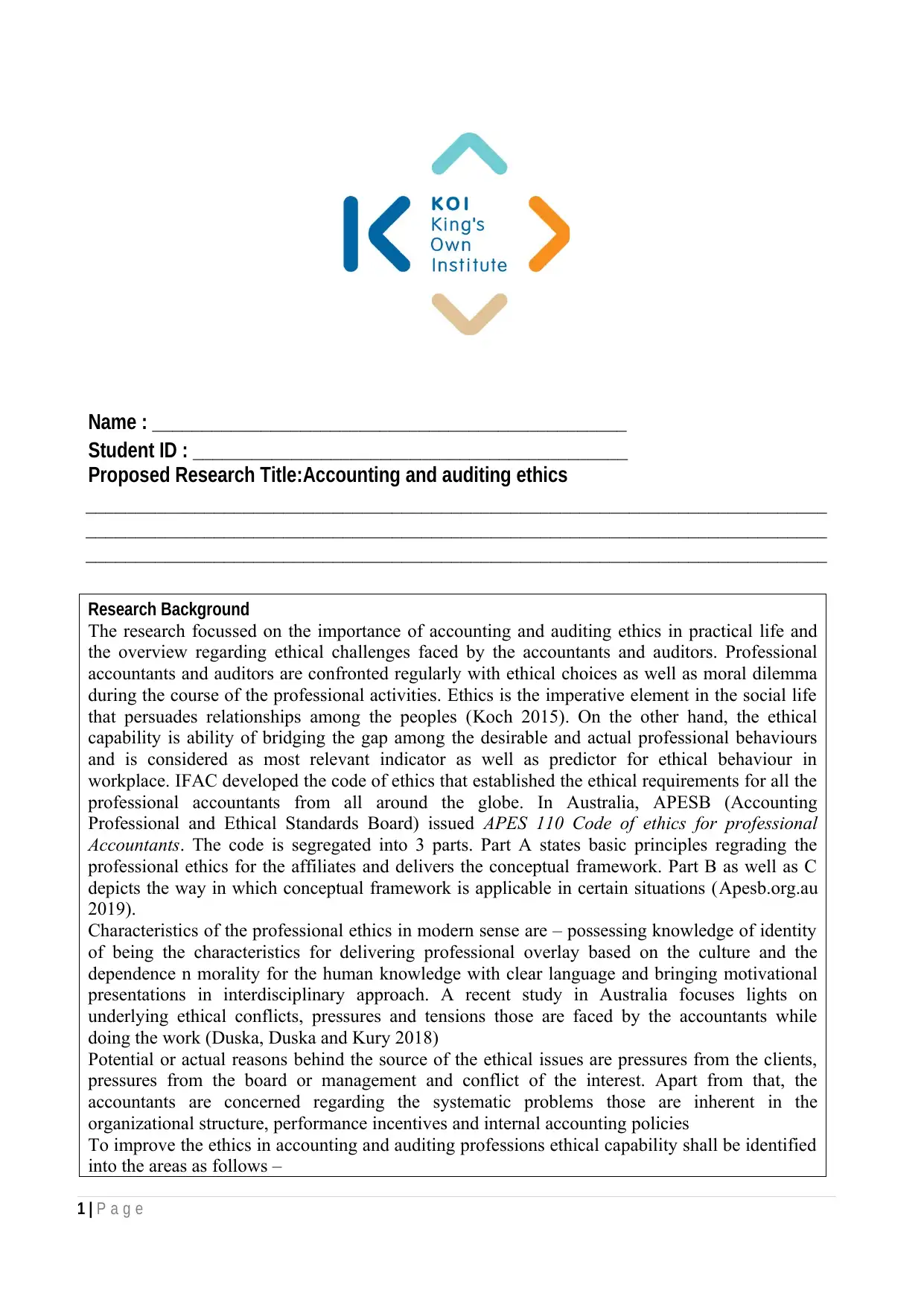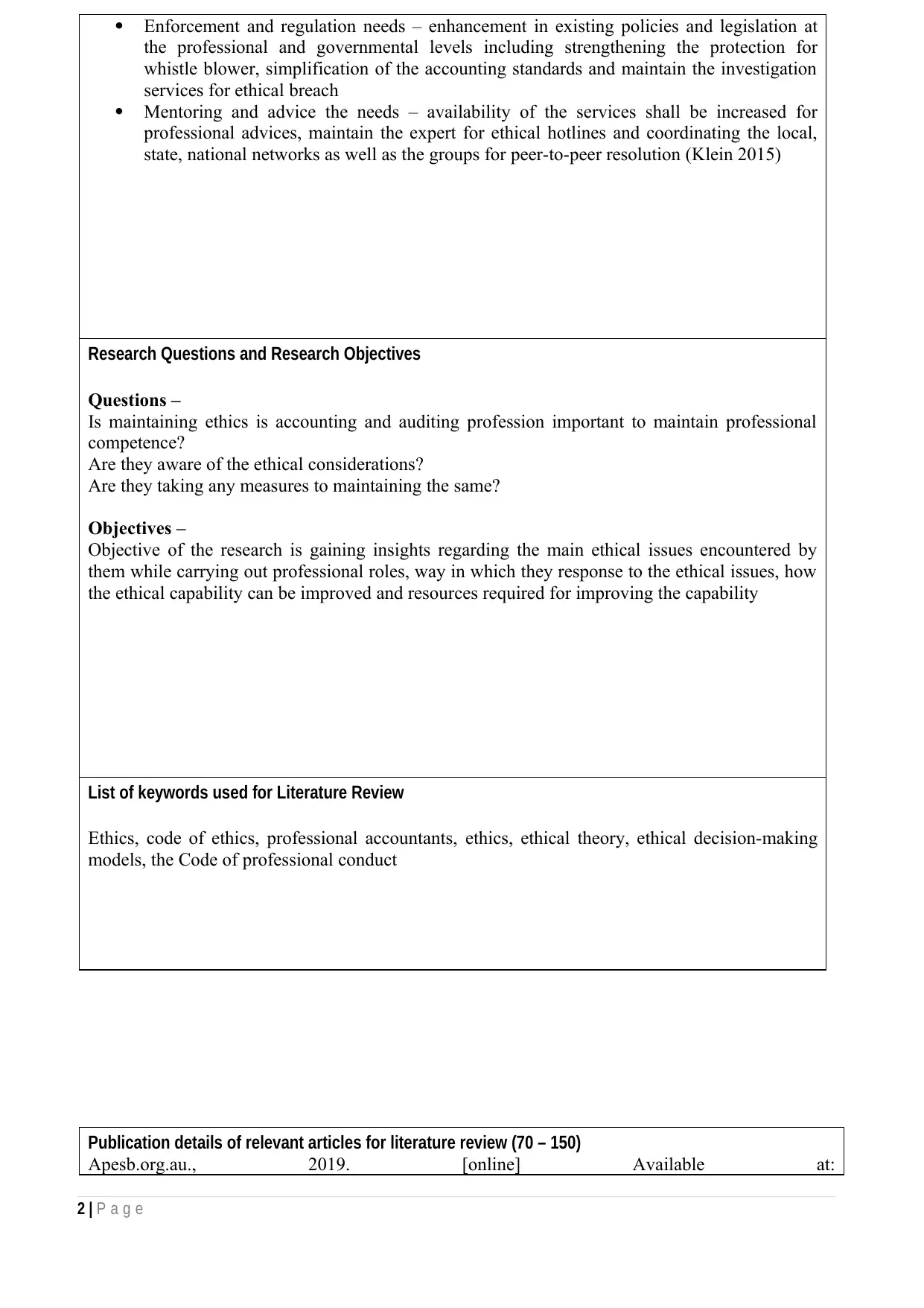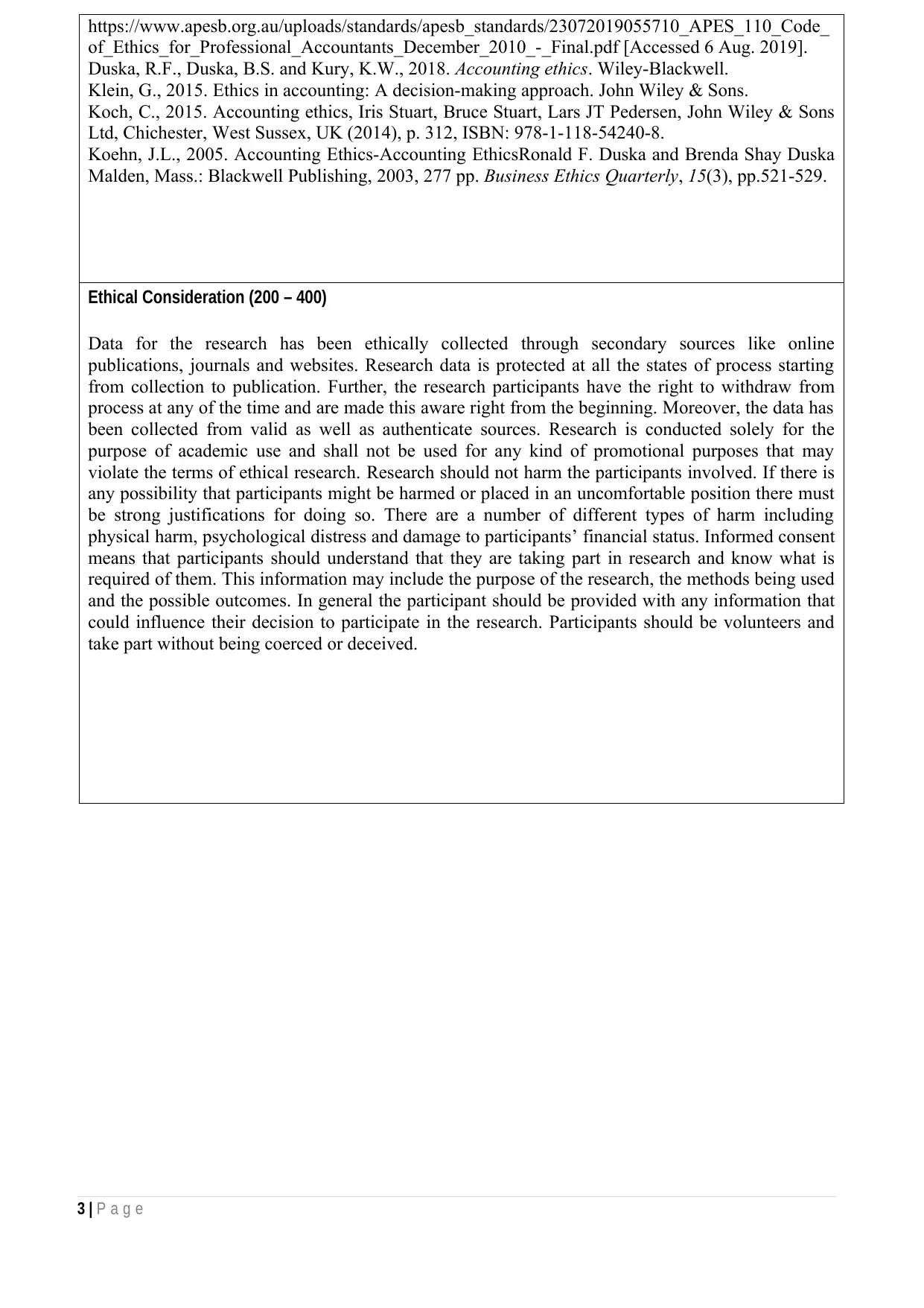Accounting and Auditing Ethics Research Plan for BUS707
VerifiedAdded on 2022/10/10
|3
|972
|2
Report
AI Summary
This report focuses on the critical importance of accounting and auditing ethics in practical life, providing an overview of the ethical challenges faced by accountants and auditors. It delves into the ethical considerations, research questions, and objectives related to maintaining professional competence and awareness of ethical standards. The report explores the significance of the Code of Ethics, the ethical issues stemming from pressures from clients, management, and conflicts of interest, and the need for improvement in ethical capability through enforcement, regulation, mentoring, and advice. It includes a literature review with relevant publication details and a discussion of ethical considerations in data collection and research practices, emphasizing informed consent and the avoidance of harm to participants. This report is a comprehensive analysis of accounting and auditing ethics, providing a framework for understanding and addressing ethical dilemmas within the profession.

Name : ________________________________________________
Student ID : ____________________________________________
Proposed Research Title:Accounting and auditing ethics
___________________________________________________________________________
___________________________________________________________________________
___________________________________________________________________________
Research Background
The research focussed on the importance of accounting and auditing ethics in practical life and
the overview regarding ethical challenges faced by the accountants and auditors. Professional
accountants and auditors are confronted regularly with ethical choices as well as moral dilemma
during the course of the professional activities. Ethics is the imperative element in the social life
that persuades relationships among the peoples (Koch 2015). On the other hand, the ethical
capability is ability of bridging the gap among the desirable and actual professional behaviours
and is considered as most relevant indicator as well as predictor for ethical behaviour in
workplace. IFAC developed the code of ethics that established the ethical requirements for all the
professional accountants from all around the globe. In Australia, APESB (Accounting
Professional and Ethical Standards Board) issued APES 110 Code of ethics for professional
Accountants. The code is segregated into 3 parts. Part A states basic principles regrading the
professional ethics for the affiliates and delivers the conceptual framework. Part B as well as C
depicts the way in which conceptual framework is applicable in certain situations (Apesb.org.au
2019).
Characteristics of the professional ethics in modern sense are – possessing knowledge of identity
of being the characteristics for delivering professional overlay based on the culture and the
dependence n morality for the human knowledge with clear language and bringing motivational
presentations in interdisciplinary approach. A recent study in Australia focuses lights on
underlying ethical conflicts, pressures and tensions those are faced by the accountants while
doing the work (Duska, Duska and Kury 2018)
Potential or actual reasons behind the source of the ethical issues are pressures from the clients,
pressures from the board or management and conflict of the interest. Apart from that, the
accountants are concerned regarding the systematic problems those are inherent in the
organizational structure, performance incentives and internal accounting policies
To improve the ethics in accounting and auditing professions ethical capability shall be identified
into the areas as follows –
1 | P a g e
Student ID : ____________________________________________
Proposed Research Title:Accounting and auditing ethics
___________________________________________________________________________
___________________________________________________________________________
___________________________________________________________________________
Research Background
The research focussed on the importance of accounting and auditing ethics in practical life and
the overview regarding ethical challenges faced by the accountants and auditors. Professional
accountants and auditors are confronted regularly with ethical choices as well as moral dilemma
during the course of the professional activities. Ethics is the imperative element in the social life
that persuades relationships among the peoples (Koch 2015). On the other hand, the ethical
capability is ability of bridging the gap among the desirable and actual professional behaviours
and is considered as most relevant indicator as well as predictor for ethical behaviour in
workplace. IFAC developed the code of ethics that established the ethical requirements for all the
professional accountants from all around the globe. In Australia, APESB (Accounting
Professional and Ethical Standards Board) issued APES 110 Code of ethics for professional
Accountants. The code is segregated into 3 parts. Part A states basic principles regrading the
professional ethics for the affiliates and delivers the conceptual framework. Part B as well as C
depicts the way in which conceptual framework is applicable in certain situations (Apesb.org.au
2019).
Characteristics of the professional ethics in modern sense are – possessing knowledge of identity
of being the characteristics for delivering professional overlay based on the culture and the
dependence n morality for the human knowledge with clear language and bringing motivational
presentations in interdisciplinary approach. A recent study in Australia focuses lights on
underlying ethical conflicts, pressures and tensions those are faced by the accountants while
doing the work (Duska, Duska and Kury 2018)
Potential or actual reasons behind the source of the ethical issues are pressures from the clients,
pressures from the board or management and conflict of the interest. Apart from that, the
accountants are concerned regarding the systematic problems those are inherent in the
organizational structure, performance incentives and internal accounting policies
To improve the ethics in accounting and auditing professions ethical capability shall be identified
into the areas as follows –
1 | P a g e
Paraphrase This Document
Need a fresh take? Get an instant paraphrase of this document with our AI Paraphraser

Enforcement and regulation needs – enhancement in existing policies and legislation at
the professional and governmental levels including strengthening the protection for
whistle blower, simplification of the accounting standards and maintain the investigation
services for ethical breach
Mentoring and advice the needs – availability of the services shall be increased for
professional advices, maintain the expert for ethical hotlines and coordinating the local,
state, national networks as well as the groups for peer-to-peer resolution (Klein 2015)
Research Questions and Research Objectives
Questions –
Is maintaining ethics is accounting and auditing profession important to maintain professional
competence?
Are they aware of the ethical considerations?
Are they taking any measures to maintaining the same?
Objectives –
Objective of the research is gaining insights regarding the main ethical issues encountered by
them while carrying out professional roles, way in which they response to the ethical issues, how
the ethical capability can be improved and resources required for improving the capability
List of keywords used for Literature Review
Ethics, code of ethics, professional accountants, ethics, ethical theory, ethical decision-making
models, the Code of professional conduct
Publication details of relevant articles for literature review (70 – 150)
Apesb.org.au., 2019. [online] Available at:
2 | P a g e
the professional and governmental levels including strengthening the protection for
whistle blower, simplification of the accounting standards and maintain the investigation
services for ethical breach
Mentoring and advice the needs – availability of the services shall be increased for
professional advices, maintain the expert for ethical hotlines and coordinating the local,
state, national networks as well as the groups for peer-to-peer resolution (Klein 2015)
Research Questions and Research Objectives
Questions –
Is maintaining ethics is accounting and auditing profession important to maintain professional
competence?
Are they aware of the ethical considerations?
Are they taking any measures to maintaining the same?
Objectives –
Objective of the research is gaining insights regarding the main ethical issues encountered by
them while carrying out professional roles, way in which they response to the ethical issues, how
the ethical capability can be improved and resources required for improving the capability
List of keywords used for Literature Review
Ethics, code of ethics, professional accountants, ethics, ethical theory, ethical decision-making
models, the Code of professional conduct
Publication details of relevant articles for literature review (70 – 150)
Apesb.org.au., 2019. [online] Available at:
2 | P a g e

https://www.apesb.org.au/uploads/standards/apesb_standards/23072019055710_APES_110_Code_
of_Ethics_for_Professional_Accountants_December_2010_-_Final.pdf [Accessed 6 Aug. 2019].
Duska, R.F., Duska, B.S. and Kury, K.W., 2018. Accounting ethics. Wiley-Blackwell.
Klein, G., 2015. Ethics in accounting: A decision-making approach. John Wiley & Sons.
Koch, C., 2015. Accounting ethics, Iris Stuart, Bruce Stuart, Lars JT Pedersen, John Wiley & Sons
Ltd, Chichester, West Sussex, UK (2014), p. 312, ISBN: 978-1-118-54240-8.
Koehn, J.L., 2005. Accounting Ethics-Accounting EthicsRonald F. Duska and Brenda Shay Duska
Malden, Mass.: Blackwell Publishing, 2003, 277 pp. Business Ethics Quarterly, 15(3), pp.521-529.
Ethical Consideration (200 – 400)
Data for the research has been ethically collected through secondary sources like online
publications, journals and websites. Research data is protected at all the states of process starting
from collection to publication. Further, the research participants have the right to withdraw from
process at any of the time and are made this aware right from the beginning. Moreover, the data has
been collected from valid as well as authenticate sources. Research is conducted solely for the
purpose of academic use and shall not be used for any kind of promotional purposes that may
violate the terms of ethical research. Research should not harm the participants involved. If there is
any possibility that participants might be harmed or placed in an uncomfortable position there must
be strong justifications for doing so. There are a number of different types of harm including
physical harm, psychological distress and damage to participants’ financial status. Informed consent
means that participants should understand that they are taking part in research and know what is
required of them. This information may include the purpose of the research, the methods being used
and the possible outcomes. In general the participant should be provided with any information that
could influence their decision to participate in the research. Participants should be volunteers and
take part without being coerced or deceived.
3 | P a g e
of_Ethics_for_Professional_Accountants_December_2010_-_Final.pdf [Accessed 6 Aug. 2019].
Duska, R.F., Duska, B.S. and Kury, K.W., 2018. Accounting ethics. Wiley-Blackwell.
Klein, G., 2015. Ethics in accounting: A decision-making approach. John Wiley & Sons.
Koch, C., 2015. Accounting ethics, Iris Stuart, Bruce Stuart, Lars JT Pedersen, John Wiley & Sons
Ltd, Chichester, West Sussex, UK (2014), p. 312, ISBN: 978-1-118-54240-8.
Koehn, J.L., 2005. Accounting Ethics-Accounting EthicsRonald F. Duska and Brenda Shay Duska
Malden, Mass.: Blackwell Publishing, 2003, 277 pp. Business Ethics Quarterly, 15(3), pp.521-529.
Ethical Consideration (200 – 400)
Data for the research has been ethically collected through secondary sources like online
publications, journals and websites. Research data is protected at all the states of process starting
from collection to publication. Further, the research participants have the right to withdraw from
process at any of the time and are made this aware right from the beginning. Moreover, the data has
been collected from valid as well as authenticate sources. Research is conducted solely for the
purpose of academic use and shall not be used for any kind of promotional purposes that may
violate the terms of ethical research. Research should not harm the participants involved. If there is
any possibility that participants might be harmed or placed in an uncomfortable position there must
be strong justifications for doing so. There are a number of different types of harm including
physical harm, psychological distress and damage to participants’ financial status. Informed consent
means that participants should understand that they are taking part in research and know what is
required of them. This information may include the purpose of the research, the methods being used
and the possible outcomes. In general the participant should be provided with any information that
could influence their decision to participate in the research. Participants should be volunteers and
take part without being coerced or deceived.
3 | P a g e
⊘ This is a preview!⊘
Do you want full access?
Subscribe today to unlock all pages.

Trusted by 1+ million students worldwide
1 out of 3
Related Documents
Your All-in-One AI-Powered Toolkit for Academic Success.
+13062052269
info@desklib.com
Available 24*7 on WhatsApp / Email
![[object Object]](/_next/static/media/star-bottom.7253800d.svg)
Unlock your academic potential
Copyright © 2020–2026 A2Z Services. All Rights Reserved. Developed and managed by ZUCOL.




